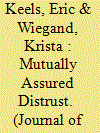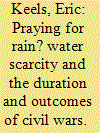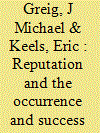|
|
|
Sort Order |
|
|
|
Items / Page
|
|
|
|
|
|
|
| Srl | Item |
| 1 |
ID:
165680


|
|
|
|
|
| Summary/Abstract |
Within the study of mediation, a common argument is that mediators are often successful because they provide credible information to combatants thereby reducing asymmetries of information. Unfortunately, there are a number of reasons to assume that rebel groups are providing misinformation to mediators as well as to the government. Equally, mediators must also deal with an incumbent government that may not be negotiating in good faith. This study suggests that rebel group structure may assist with this problem. Rebel groups that operate parallel political wings often inadvertently signal their reservation points in an effort to mobilize support. Mediators also seek signals that the government is willing to credibly commit to a settlement. Leadership turnover may be one such signal, as new leaders are not beholden to old vested interests. To evaluate these propositions, a statistical test of mediation efforts in civil wars is conducted from 1989 to 2005.
|
|
|
|
|
|
|
|
|
|
|
|
|
|
|
|
| 2 |
ID:
175347


|
|
|
|
|
| Summary/Abstract |
Within the study of intrastate armed conflicts, many scholars rely on a bargaining model when explaining why some civil wars are intractable. Primarily, scholars posit that commitment problems represent a key barrier to settling conflicts through negotiations. Yet, some civil wars are more easily resolved than others. If commitment problems are a universal feature of civil wars, what explains why commitment problems are more salient in some conflicts as compared to others? We argue that ideological differences between combatants enhance commitment problems in civil wars. Assuming that ideology is used by combatants to generate support, concessions that violate the ideological goals of each side may alienate supporters. With extreme ideological polarization, concessions may be viewed as relative as opposed to absolute, making it difficult for either side to credibly commit to offer concessions. To test these claims, we quantitatively examine the duration and outcome of all intrastate conflicts from 1975 to 2011.
|
|
|
|
|
|
|
|
|
|
|
|
|
|
|
|
| 3 |
ID:
164517


|
|
|
|
|
| Summary/Abstract |
Recent anecdotal evidence from the civil wars in Somalia and Yemen suggest that water scarcity may shape the dynamics of civil wars. While a considerable body of research has examined the connection between water scarcity (such as low rainfall) and the onset of civil war, very little research has examined how water scarcity may shape the duration and outcomes of civil wars. Looking specifically at rainfall, this paper argues that changes in access to water play a key role in the duration of civil wars. As rainfall declines, there is a reduction in resources available to both the government and the rebel group, leading to a stalemate in fighting. Furthermore, this paper argues that declines in rainfall are felt more acutely by rebel groups who seek to challenge the government through conventional warfare. This paper tests these propositions using hazard models. The results provide robust support for the propositions.
|
|
|
|
|
|
|
|
|
|
|
|
|
|
|
|
| 4 |
ID:
166002


|
|
|
|
|
| Summary/Abstract |
In this article, we argue that because governments fear that accepting mediation and reaching agreements with opponents may signal weakness to other potential challengers, civil war governments tend to resist mediation as a means of demonstrating their resolve. Building on current theories of reputation in civil war, we argue that the threat of future challenges from other groups is likely to be particularly acute in states with multiple ethnic groups, especially states with high levels of ethnic exclusion. We therefore expect that civil wars in these states will be less likely to see mediation and to produce agreements when they do. By examining all instances of mediation in intrastate conflict from 1990 to 2008, we test this argument empirically and find that mediation is more likely to emerge in civil wars where there are a large number of ethnic groups, but is less likely to occur when many of those ethnic groups are excluded from the political process. Once mediation is underway, however, it is less likely to yield a negotiated settlement when there are a large number of ethnic groups, but more likely to end in a negotiated settlement when many of the ethnic groups are excluded from the political process.
|
|
|
|
|
|
|
|
|
|
|
|
|
|
|
|
| 5 |
ID:
163500


|
|
|
|
|
| Summary/Abstract |
Land reform has been depicted by some as an effective element of counterinsurgency strategy in nations experiencing peasant-based civil conflict. While some studies have argued that land reform reduces civilian support for insurgency, other research has demonstrated that these reforms are often undermined by brutal state repression. The study of land reform has also been driven largely by qualitative case study research, which has limited what we know about the cross-national efficacy of these reforms. This study contributes to the current literature by looking at the efficacy of land reform as part of the post-civil war peace process. Specifically, we examine whether land reform provisions included in comprehensive peace agreements reduce the risk of renewed civil war. Measuring the risk of civil war recurrence in all comprehensive peace agreements from 1989–2012, we find that the inclusion of land reform provisions in the post-war peace process substantially reduces the risk of renewed fighting.
|
|
|
|
|
|
|
|
|
|
|
|
|
|
|
|
|
|
|
|
|